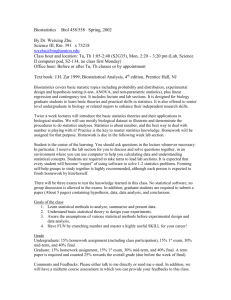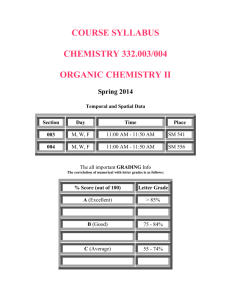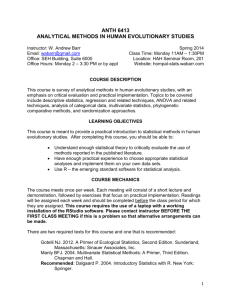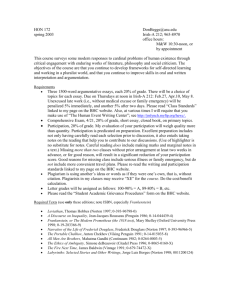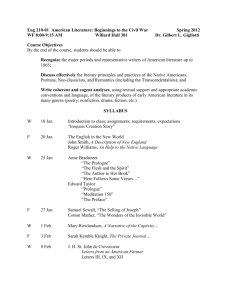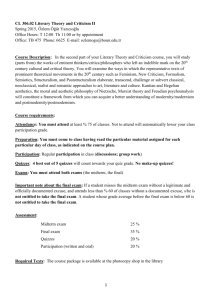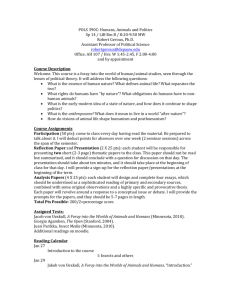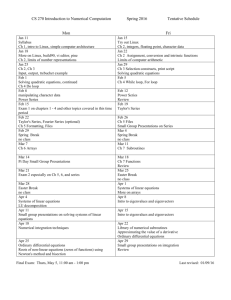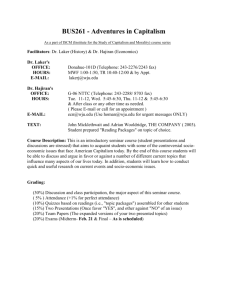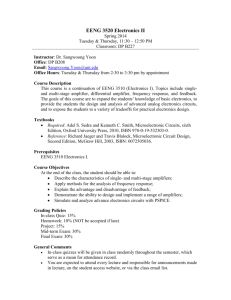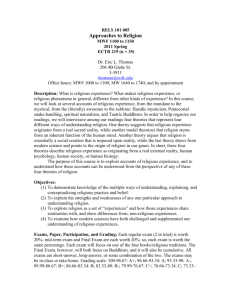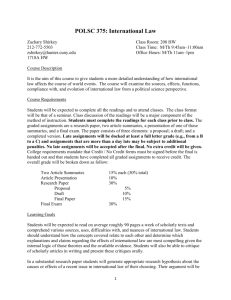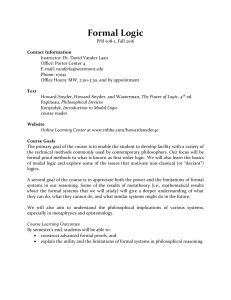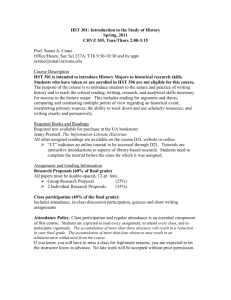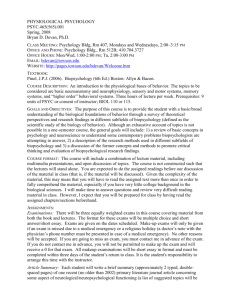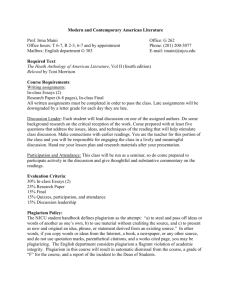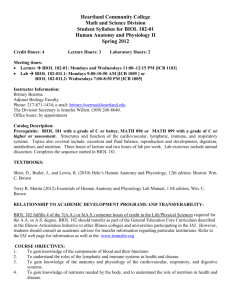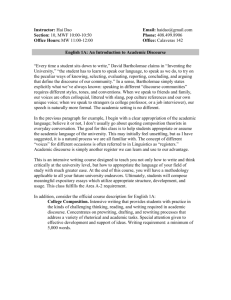Turner-hist3001b - Georgia Regents University
advertisement
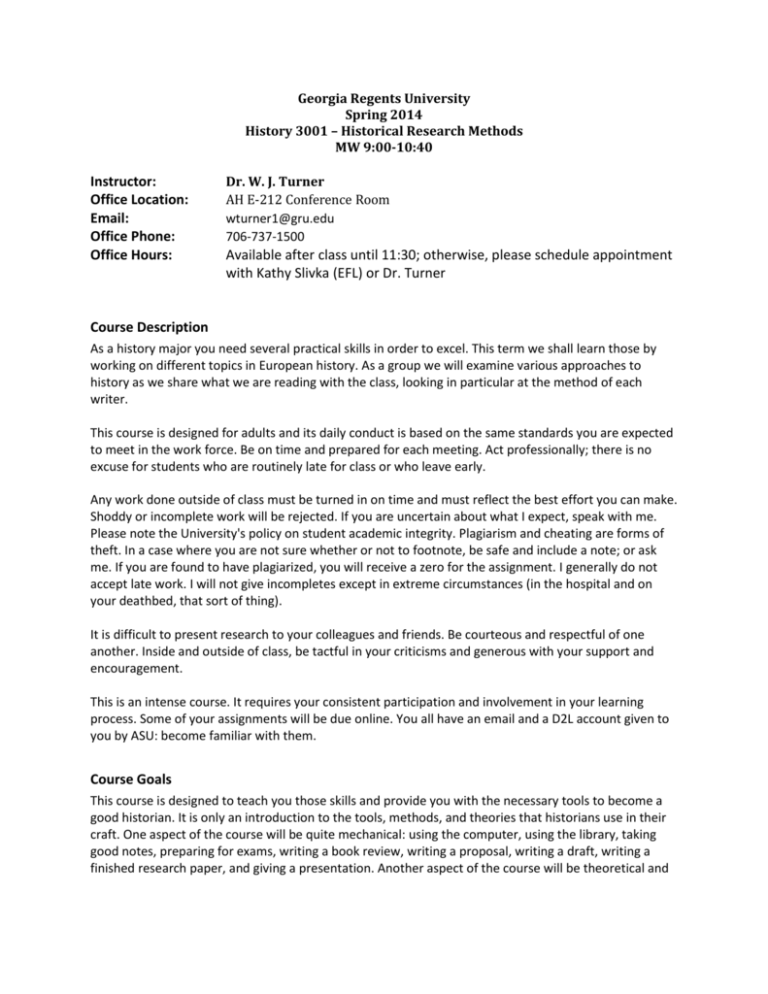
Georgia Regents University Spring 2014 History 3001 – Historical Research Methods MW 9:00-10:40 Instructor: Office Location: Email: Office Phone: Office Hours: Dr. W. J. Turner AH E-212 Conference Room wturner1@gru.edu 706-737-1500 Available after class until 11:30; otherwise, please schedule appointment with Kathy Slivka (EFL) or Dr. Turner Course Description As a history major you need several practical skills in order to excel. This term we shall learn those by working on different topics in European history. As a group we will examine various approaches to history as we share what we are reading with the class, looking in particular at the method of each writer. This course is designed for adults and its daily conduct is based on the same standards you are expected to meet in the work force. Be on time and prepared for each meeting. Act professionally; there is no excuse for students who are routinely late for class or who leave early. Any work done outside of class must be turned in on time and must reflect the best effort you can make. Shoddy or incomplete work will be rejected. If you are uncertain about what I expect, speak with me. Please note the University's policy on student academic integrity. Plagiarism and cheating are forms of theft. In a case where you are not sure whether or not to footnote, be safe and include a note; or ask me. If you are found to have plagiarized, you will receive a zero for the assignment. I generally do not accept late work. I will not give incompletes except in extreme circumstances (in the hospital and on your deathbed, that sort of thing). It is difficult to present research to your colleagues and friends. Be courteous and respectful of one another. Inside and outside of class, be tactful in your criticisms and generous with your support and encouragement. This is an intense course. It requires your consistent participation and involvement in your learning process. Some of your assignments will be due online. You all have an email and a D2L account given to you by ASU: become familiar with them. Course Goals This course is designed to teach you those skills and provide you with the necessary tools to become a good historian. It is only an introduction to the tools, methods, and theories that historians use in their craft. One aspect of the course will be quite mechanical: using the computer, using the library, taking good notes, preparing for exams, writing a book review, writing a proposal, writing a draft, writing a finished research paper, and giving a presentation. Another aspect of the course will be theoretical and methodological: identifying the craft of an historian. You will investigate and share your findings about great historians and produce a paper using the skills you have learned. Learning Objectives At the end of the course you should be able to: o use the computer programs normally employed by historians o use the materials found in the library reference room o write an essay examination o write a book review o write a research paper o present historical information in a public forum o understand the contributions of some of the world's great historians o discuss historical material in a professional manner Pre-Requisites None. Teaching Methods or Teaching Philosophy This is a seminar style course. You are expected to keep up with the work and arrived prepared for discussion. I will facilitate the discussion but it is up to you to provide the content. I strongly encourage you to arrive ready to ask questions about your topic, about methods, or about writing issues. Expectations and Grading Research project This course is based around your research project. You will select an aspect of European history and write a paper to answer a specific question. We will talk about questions in class. The paper will be written, as all papers are, in stages. But, rather than only turning in the final copy, in this class you will turn in each stage so that at each stage in the process you get feedback and guidance in order to hone your historical research skills. 1. Proposal - 50 points This consists of a restated question, a thesis, and an initial bibliography. 2. Book Review - 50 points You will review a monograph—an historical book on a specific topic— that pertains to the research you are doing. I will give you examples of good and bad book reviews, and we will talk about how to approach reviewing the work of your colleagues and peers. 3. First Draft Paper - 50 points This draft may be incomplete but it should be as complete as you can get it. It should be in the general formal of the final paper. 4. Second Draft Paper- 100 points This should be a finished paper. All notes and text should be properly formatted. If the paper is as finished as you can get it, you can opt out of the final draft and take the same grade for both the second draft and the final draft. 5. Final Paper- 200 points This will be your finished, polished, as-perfect-as-you-can-get-it formal research paper prepared in accordance with class comments and the standards contained in Turabian’s Manual. (See book list.) Other assignments Presentation - 100 points This is a formal "peer review" session in which you will present the substance of your paper to the class. Student and instructor comments will focus on ways you can improve your work before turning in your final copy. Each presentation will take about 20 minutes (think about 2 minutes per page) with 10 minutes for questions. Reviews of Colleagues – 50 points When your colleagues present, you will practice how to grade and comment. We will discuss how to do this in class. You will receive your comments in time to make adjustments to your paper. Final Exam - 100 points The final is cumulative. The purpose of this exam is for you to demonstrate how much you have learned about the historians discussed in class and the proper methods of preparing for and taking an examination. Class participation and attendance - 100 points The business of history is much more than simply reading books and writing papers. Discussing, comparing, peer reviewing, and listening to papers brings depth to your own work and breadth of knowledge. Presentation of ideas and papers also adds to your understanding of a topic and the general knowledge of others, a "high-class" version of instructing. Discussions concerning the latest ideas about the field of history are important to you as a scholar. You must, therefore, attend class in order to pass the course. You will also be expected to present aspects of your research in class for the benefit of your fellow classmates and instructor. Grand Total - 800 points Explanation of Academic Grades Many people ask, "What does it mean to get a 'B'?" An 'A' indicates: The student's performance exceeds the expectations and standards of the class. Their work is on time, complete, and represents a best effort. The student is willing and prepared to participate. The student performs at the highest cognitive level, demonstrating an ability to synthesize and evaluate the material presented. A 'B' indicates: The student's performance meets the expectations and standards of the class. Their work is on time, complete, and represents a good effort. The student has only occasionally missed class or arrived late. The student performs at the middle cognitive level, consistently demonstrating an ability to analyze, apply and comprehend the material presented. A 'C' indicates: The student's performance partially meets the standards of the class. Work may be late, or missing. Work appears to have been a hasty attempt to meet the requirement. The student may have missed classes or arrived late regularly. The student performs at a lower cognitive level, demonstrating an ability to comprehend and memorize the material presented. A 'D' or an 'F' indicates: The student's performance does not meet the standards of the class. Work may be late or missing, or it may represent an unsatisfactory attempt to meet the requirement. The student may not have attended with regularity. The student has not performed at the lower cognitive levels and understands or retains little of the material presented. Text and Resources Daniel Lord Smail, On Deep History and the Brain, UC Press, 2008, ISBN 978-0-520-25812-9 Kate Turabian, A Manual for Writers, Eighth Edition, Chicago Press, 2013, ISBN 978-0-22681638-8 Carlo Guinzburg, Threads and Traces: True and False Fictive, UC Press, 2012, ISBN 978-0-52027448-8 Some material will be handed out in class. Academic Honor GRU maintains a strict policy on plagiarism (stealing of another person’s written work or ideas) and academic honesty. We will discuss this further in class, but any student caught not doing his or her own work, intentionally not including references in an effort to pass off work done by another as his or her own, will receive a failing grade for the assignment. As the professor deems appropriate, a formal record of such plagiarism will be filed with the department and the university becoming part of the student’s permanent record and could result in expulsion from the university or difficulty finding employment after graduation. Please, when in doubt, add footnotes or ask. Student Needs Students with disabilities (physical or learning) enrolled in this course and who may need disability-related classroom accommodations are encouraged to make an appointment to see me before the end of the second week of the term. All discussions will remain confidential, although the Office of Testing and Disability Services might need to be consulted to discuss appropriate implementation of any accommodation requests. For this particular course, most all work is done at home or in the library and you should have ample time to complete your work. Additional Support for your Learning Many of you might want to take advantage of the Writing Center’s Peer Tutoring Services. If you are not a strong writer or have forgotten many of the rules of writing, please take advantage of their services. As the term goes along, they often become busy. Be sure to make appointments early. Tentative Course Schedule Phase Date(s) Topics or Activities 1 Jan 6, M Jan 8, W Introduction to Historical Research Methods Choosing topics: a how to guide Jan 13, M Discussion: What is a method? Jan 15, W Methods of organization / Methods of research; writing proposals Jan 20, M Reading and Research: Two different things? 2 Jan 22, W Jan 27, M Jan 29, W Feb 3, M Writing book reviews Guest Speaker Library Feb 5, W Library Feb 10, M Technical Grammar Stuff you should know! Feb 12, W Discussion: methods of the monographs you read Feb 17, M Learning Objectives Addressed Critical Thinking; proposals Computer; critical thinking Computer; library; critical thinking; note taking Computer; critical thinking; note taking Theory Note taking; Computer; library Computer; library Computer; writing skills; research rules Library Research; writing Assignments, Exams, or Readings Topic Ideas Due (no credit) Topic Proposal Due (50 points) Discussion: Ginzburg Book review due How to use Turabian Feb 19, W Theory Feb 24, M Writing a test / Taking a test Feb 26, W Mar 3, M Historiography: what is it? Historiography: how can it help me? Mar 5, W 3 4 No Class (I’m reading) Individual Meetings Individual Meetings Individual Meetings Second Draft Due Mar 26, W Mar 31, M Apr 2, W Apr 7, M Apr 9, W Apr 14, M Apr 16, W Apr 21, M Apr 23, W Individual Meetings Individual Meetings Individual Meetings Spring Break Spring Break Presentations Presentations Presentations Discussion: What have you learned and how do you apply it in your other classes? Final Paper Due Apr 28, M Apr 30, W May 5, M Test understanding Theory Theory Writing; research; critical thinking Mar 10, M Mar 12, W Mar 17, M Mar 19, W Mar 24, M Finals Discussion: Daniel Lord Smail Writing; research; critical thinking Presenting Presenting Presenting Writing; research; critical thinking First Draft Due




